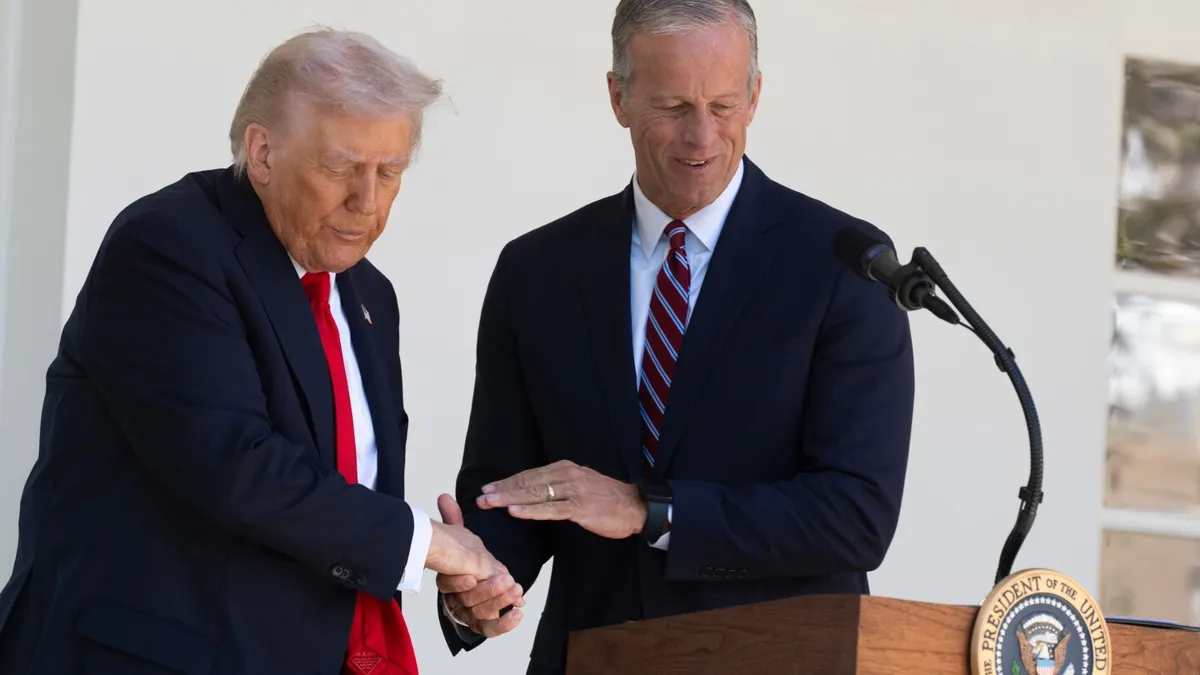
In a recent social media post, President Donald Trump expressed frustration over the ongoing government shutdown and the resistance from Democrats to support a Republican funding bill. He urged the Senate to eliminate the legislative filibuster, a parliamentary procedure that requires 60 votes to advance most bills in the 100-member chamber. This longstanding rule has often hindered policy initiatives from both parties, sparking Trump's ongoing complaints since his first term in office.
The filibuster allows senators to delay or block legislation by extending debate. This tactic has evolved over time; unlike the House of Representatives, which imposes strict limits on debate, the Senate grants its members the right to speak at length. The term "filibuster" gained traction in the mid-19th century, although it is not explicitly mentioned in the U.S. Constitution. The rule emerged after Vice President Aaron Burr criticized the Senate's procedural rules in 1805, leading to its inadvertent adoption. Historically viewed as a tool for prolonged debate, the modern filibuster often involves senators notifying their leaders of their intent to block legislation, bypassing the need for lengthy speeches.
While the filibuster remains in place for most legislation, it was eliminated for judicial nominations in 2013 under then-Senate Majority Leader Harry Reid, a move that triggered the so-called “nuclear option.” This change was motivated by frustrations over repeated Republican filibusters of President Barack Obama’s nominees. In 2017, Republicans followed suit by abolishing the filibuster for Supreme Court nominees while confirming Neil Gorsuch. Trump's recent comments on social media suggested that eliminating the filibuster could enable Republicans to secure the “best judges” and “best U.S. Attorneys,” although it is unclear how this relates to his ability to appoint these positions, which typically require only a simple majority.
The current government shutdown highlights the significant role of the filibuster in legislative negotiations. With Republicans holding only 53 seats in the Senate, they require bipartisan support to clear the 60-vote threshold for funding bills. Many Democrats are leveraging this situation, demanding an extension of subsidies for health coverage under the Affordable Care Act in exchange for their votes. Republicans view these demands as costly and unnecessary, especially for a short-term funding measure. As the shutdown persists, some frustrated Republicans have begun to advocate for the abolition of the filibuster to regain legislative control. Senator Bernie Moreno (R-Ohio) recently suggested the possibility of removing the filibuster to facilitate the government's reopening.
Despite Trump's calls for its elimination, the majority of Republican senators have resisted the idea of abolishing the filibuster. Senate Majority Leader John Thune has consistently defended the filibuster, stating that it is essential to maintain the Senate's unique character and that the 60-vote threshold has historically protected the country. His spokesperson reiterated that Thune’s stance remains unchanged in light of Trump’s demands. Veteran senators, who have witnessed the pendulum of power shift between parties, are particularly inclined to preserve the filibuster. Newer senators, such as John Curtis (R-Utah), also advocate for maintaining this legislative tool, emphasizing the importance of finding common ground in the Senate.
While House Republicans often attempt to influence Senate strategy, they lack the authority to dictate Senate operations. Speaker Mike Johnson acknowledged his communication with Trump regarding the filibuster but refrained from taking a public position on the matter, stating, “It’s not my call.” As the debate continues, the future of the filibuster remains a contentious issue in the context of the ongoing government shutdown and broader legislative priorities.